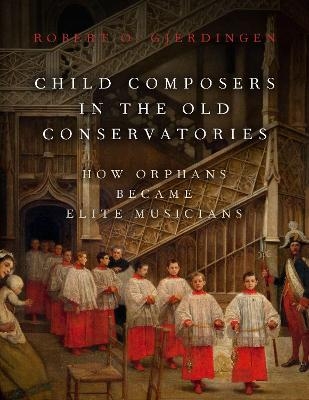
Child Composers in the Old Conservatories
Oxford University Press Inc (Verlag)
978-0-19-065359-0 (ISBN)
In seventeenth century Italy, overcrowding, violent political uprising, and plague led an astonishing number of abandoned and orphaned children to overwhelm the cities. Out of the piety of private citizens and the apathy of local governments, the system of conservatori was created to house, nurture, and train these fanciulli vaganti (roaming children) to become hatters, shoemakers, tailors, goldsmiths, cabinet makers, and musicians - a range of practical trades that might sustain them and enable them to contribute to society. Conservatori were founded across Italy, from Venice and Florence to Parma and Naples, many specializing in a particular trade. Four music conservatori in Naples gained particular renown for their exceptional training of musicians, both performers and composers, all boys. By the eighteenth century, the graduates of the Naples conservatories began to spread across Europe, with some 600 boys formerly in residence beginning to dominate the European musical world. Other conservatories in the country - including the Paris Conservatory - began to imitate the principles of the Naples' conservatory's training, known as the partimento tradition. The daily lessons and exercises associated with this tradition were largely lost-until author Robert Gjerdingen discovered evidence of them in the archives of conservatories across Italy and the rest of Europe.
Compellingly narrated and richly illustrated, Child Composers in the Old Conservatory follows the story of these boys as they undergo rigorous training with the conservatory's maestri and eventually become maestri themselves, then moves forward in time to see the influence of partimenti in the training of such composers as Claude Debussy and Colette Boyer. Advocating for the revival of partimenti in modern music education, the book explores the tremendous potential of this tradition to enable natural musical fluency for students of all ages learning the craft today.
Robert Gjerdingen is Professor of Music at Northwestern University's School of Music.
Preface
1. Introduction
Part I - Children in Need
2. Little Boys on Their Own
3. Masters Take Up the Challenge
4. Child Labor
5. Institutionalized Apprenticeship
6. Social Class
Part II - Technologies of Traning
7. Schemas and Exemplars
8. Solfeggi and the Acquisition of Style
9. Partimenti and the Power of Improvisation
10. Counterpoint and Collocation
11. Intavolature and the Techniques of Instruments.
12. Dispositions and the Mastery of Complexity
Part III - Trial by Contest
13. Little Masters, Real Masters, and Masterpieces
14. The Contest Piece as a Probe of Memory
15. Affordance and the Musical Habitus
16. Predicting Creativity Within a Tradition
17. A Sickly Young Woman Speaks Elegant Harmony
Part IV - Transforming Commonplaces
18. The Oval and Cross
19. A Framework for Elaboration
20. The Beaux-Arts Framework
21. A Beaux-Arts Framework for Music
22. Learning Old Music in an Age of Digital Reproduction
Appendix A: For Further Study
Appendix B: Movimenti, Schemas, and Exemplars
Index of Names
| Erscheinungsdatum | 10.02.2020 |
|---|---|
| Zusatzinfo | 157 halftones; 172 line illustrations |
| Verlagsort | New York |
| Sprache | englisch |
| Maße | 216 x 279 mm |
| Gewicht | 1202 g |
| Themenwelt | Kunst / Musik / Theater ► Musik ► Musiktheorie / Musiklehre |
| ISBN-10 | 0-19-065359-0 / 0190653590 |
| ISBN-13 | 978-0-19-065359-0 / 9780190653590 |
| Zustand | Neuware |
| Haben Sie eine Frage zum Produkt? |
aus dem Bereich


